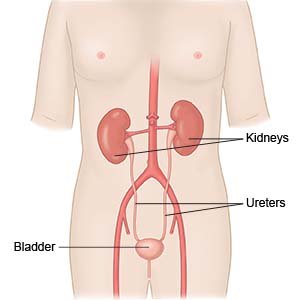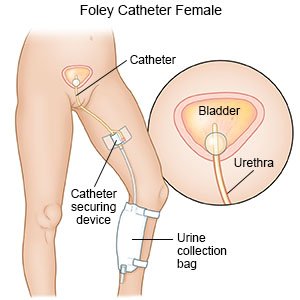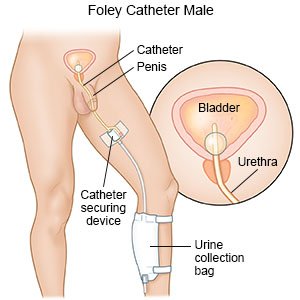Ureter Reimplantation
Medically reviewed by Drugs.com. Last updated on Aug 4, 2025.
What do I need to know about ureter reimplantation?
Ureter reimplantation is surgery to fix the position of the ureters. One or both ureters may need to be fixed.
 |
How do I help prepare my child for surgery?
- Your child's surgeon will tell you how to prepare your child. The surgeon may tell you not to give your child anything to eat or drink after midnight on the day of the surgery.
- Tell your child's surgeon about all medicines your child currently takes. The surgeon will tell you if your child needs to stop any medicine for the surgery, and when to stop. The surgeon will tell you which medicines to give or not give your child on the day of surgery.
- Tell the surgeon about any allergies your child has, including to anesthesia or medicines.
- Your child's surgeon will tell you if your child needs any tests before surgery, and when to have them.
Related medications
What will happen during surgery?
- Your child will be given general anesthesia to keep him or her asleep and free from pain during surgery. Your child may also be given a nerve block to numb him or her from the waist down. A urinary catheter will be inserted while your child is asleep. This helps drain urine from your child's bladder.


- The surgeon may do an open or laparoscopic reimplantation surgery. Open means the surgeon makes a large incision in the abdomen to see your child's bladder and ureters. Laparoscopic means the surgeon makes several small incisions in your child's abdomen. The surgeon will insert a laparoscope through the incision. This is a flexible tube with a light and camera on the end. Small surgical instruments will be inserted into the other incisions. The surgeon will complete the surgery through these small incisions.
- The surgeon will detach the ureter from the bladder. A tunnel will be made into the muscle of the bladder. The ureter will be reimplanted into the tunnel and sewn into place with stitches. The abdominal incision will be closed with stitches or skin adhesive tape and covered with a bandage.
What should my child expect after ureter reimplantation?
- Your child will be taken to a recovery room until he or she wakes up. Healthcare providers will monitor your child for any problems. Your child will then be taken to his or her hospital room. Your child will need to stay in the hospital for at least 1 night. Your child may need to stay longer depending on his or her recovery.
- The urinary catheter will stay in place until your child's ureters work properly or until the nerve block wears off. Your child may be sent home with the urinary catheter in place. Healthcare providers will teach you how to care for the catheter at home.
What are the risks of ureter reimplantation?
Your child may bleed more than expected or develop an infection. The ureters may not connect properly to the bladder or may leak urine. The kidneys, bladder, or other nearby organs may be damaged. Your child may need another surgery to fix organ damage.
Care Agreement
You have the right to help plan your child's care. Learn about your child's health condition and how it may be treated. Discuss treatment options with your child's healthcare providers to decide what care you want for your child. The above information is an educational aid only. It is not intended as medical advice for individual conditions or treatments. Talk to your doctor, nurse or pharmacist before following any medical regimen to see if it is safe and effective for you.© Copyright Merative 2025 Information is for End User's use only and may not be sold, redistributed or otherwise used for commercial purposes.
Further information
Always consult your healthcare provider to ensure the information displayed on this page applies to your personal circumstances.
